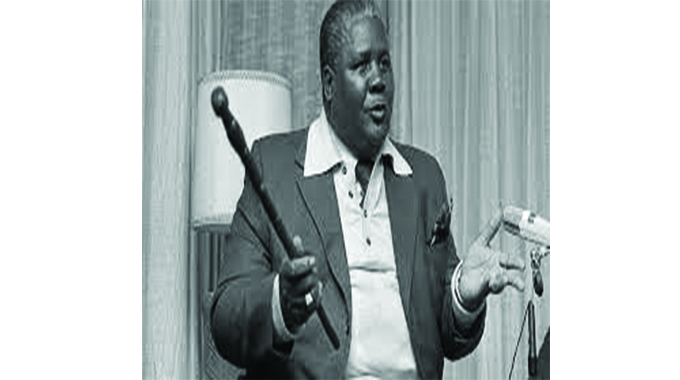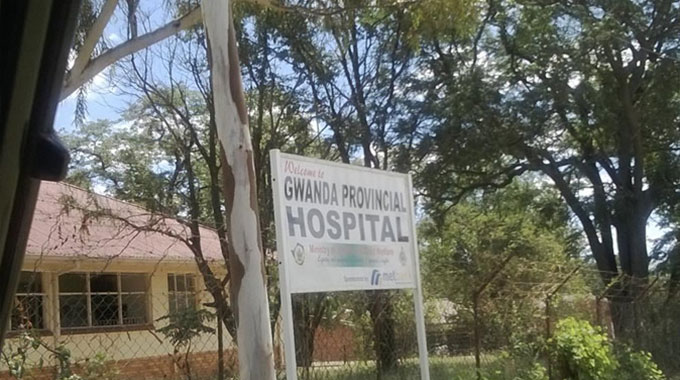
The Sunday News

Robin Muchetu, Senior Reporter
AS a 16-year-old, “Mirora Shumba” was still very young, green behind the ears but deep inside her, the revolution was brewing and all she wanted was to run away from home and join her peers in liberating the nation.
Cde Otilia Sibanda (62), born and raised in Halisupi, Manama area in Gwanda District, Matabeleland South Province said taking part in the liberation struggle was a conscious decision she made with her peers in the village.
However, when time and opportunity coincided, she went for the kill, escaped and skipped the country to Zambia in 1976.
“We were young girls then about 16 years old.
What made us want to go to the war is that we lived right near the border with Botswana and we witnessed the first group of people who went to war after being taken by the guerrillas.

Cde Otilia Sibanda
It was on 25 December 1976; we had spent the day at Bhora Bhora township where my parents had shops there.
“In the village people would gather on Christmas Day and enjoy the festivities moving from place to place and no one really checked where people were on that day.
So that is where the boys and girls were taken in Mlambaphele areas. I woke up to hear that my friend Saziso Ndebele aka Rose Sibanda had gone with the guerrillas,” said Cde Sibanda.
Young Otilia was really troubled that she had been left behind with many others who wanted to go to war. So, she and her peers devised a plan that they were not going to wait any longer but we were going to follow others.
Leaving the village
“The following week, which was New Year, we decided to go, long ago the rains would really fall and the Shashe River would be very full for weeks and it was not navigable.
We attempted one day to cross the river.
It was on a Sunday I remember we had just finished a Church service and we caucused with about 15 to 20 others and we decided to go.
“At about 8pm when the elders had retired to bed, we decided to run away.
We walked for hours to get to Shashe River and we arrived, you can just imagine, the river was full to the brim, we could not even tell the depth of the water.
So, we formed a link and held each other’s hands and decided to enter.
Upon getting our feet into the water, we felt that the water was flowing at an amazing speed that if we had entered, we were going to be washed away.
We then jumped back on to the river bank as we had seen that we were going to die if we attempted to cross.
This mission was aborted that night.”
Returning home
At the back of their minds, the teens remembered that they had run away from home and the elders had no idea that they had attempted to flee to join the liberation struggle.
“We had to make the long walk back home before it was discovered that we had run away from home.
So, we embarked on the journey back home.
We walked as fast as our legs could carry us and we arrived in the village at around 4am before people had woken up to discover that we were not there.
We got in and slept.
We were afraid that if they got wind of our escape we would get into trouble, we were going to be sold out,” she said.
Despite having had a first failed attempt, Cde Sibanda said the spirit was still within them that they should go and be with others and fight for the country.
A second attempt

Manama Mission School
The following week schools opened at Manama Mission School and Cde Sibanda and her peers saw that people could now cross the river to school, as it was no longer flooded.
“We stayed for three days and we planned to escape again.
We succeeded this time, crossed the river and we actually met our peers from Manama School where we stayed for a week then we moved to Francistown, Botswana.
Early in February the planes came to take us to Zambia, Victory Camp where the women were staying.
That became our home young as we were. We never had that nostalgia of wanting to go back home to our parents, we saw it normal that we were in that place.
In November we were told that some had to go to Mkushi Camp for training. I was chosen and I was in the First Girls Brigade under ZPRA.
Training
Cde Sibanda said young as they were, they began training, a difficult moment for the young girls.
“It was not fun; training was not easy but it’s a situation that we had to face at that moment.
But we completed training.

Dr Joshua Mqabuko Nkomo
We then told the late Dr Joshua Mqabuko Nkomo that we were now ready to go to the front, we would spend the day weeping as we wanted go and at one point we were punished as we had gone on a hunger strike and wanted to see uMdala in person.
He then came to address us, he said, “Hayi bantwabami, obhudi bathe basakwanisa okwakhathesi, impi isaseyi guerilla warfare, ayifuni bantu abanengi”,” she said.
Dr Nkomo then suggested that they get regular training and they did, up to June 1977.
The saddest day-The Mkushi Bombings of 1978.
“The day I will never forget in my life was in 19 October 1978, we were sitting at the camp around 11 am, we were just relaxed. We then heard that there was an attack at Freedom Camp (FC).
We never thought the enemy was going to reach us as FC was so far away from ours and we relaxed,” she said.
A popular song sung back then, reminds Cde Sibanda and others how tragic the events of that day were and the aptness of the lyrics was almost unbelievable.
“Laphuma laba bahle, indlela yonke yayinhle laphenduka laba bomvu, ngiyakutshela mzalwane kwakubuhlungu lomhla. Ngathi ngiyabheka enyakatho lempumalanga ngabona abafana behlezi betshonise amakhanda phansi kwakubuhlungu lowo mhla,” she sang.
“When we were bombed, I thought of that song, the sun had risen, beautifully, we were relaxed then it suddenly turned all red, the dust from the bombs, the burning bushes and when that hue was in the sky, the sun turned red.
I thought to myself that that song was an apparition of what had happened on that day.
Mkushi River was red with the blood of fellow comrades who fell into the river with injuries and some who were burning from the fires.
That is why today I do not like rivers and bodies of water, memories are still fresh from that day, the white man attacked us in such a way that they pushed us towards the river where many perished. It was a strategy by the regime,” she said with her voice breaking.
Added Cde Sibanda;
“People died; I cannot even fully explain the events of that day.
We were just children; we had no ammunition as there was no single thought that we were going to be attacked.
The helicopters dropped several bombs, napalm you name it. Sasabalala iganga lonke, there was no time to look for village mates we had come with.
We ran for personal safety and we would find ourselves with some who had died next to us where we had hidden.
All we wanted was to escape and save ourselves, like wise God saw it fit that not everyone was going to perish in that attack,” she said.
Escape to Runsefa
Soon after the attacks people fled to safety and reaching a place called Runsefa which was about 60km from Mkushi was the ultimate goal.
“We met some Zambians as we were escaping and we wanted to get directions to this place. As they saw us, they sympathized with us.
‘Ohhh Mkushi iatakiwe na mushope, Smith abwera na napalm kumasoja aNkomo’’.
It was around 1pm when we saw the Zambians and they told us if we maintained our momentum, we would arrive at sunset.
And we ran, walked, anything to ensure that we reached Runsefa. Some were naked and we never cared.
I was in my full combat and there was one girl who was totally naked, I removed my top and gave were to cover up below, I continued in my trousers, bare chested, we never worried about that as we had our eyes on the ball, we needed to arrive in time and we did,” said Cde Sibanda.
After being welcomed in Runsefa all they wanted was to got to Lusaka where Dr Nkomo was as they were not too sure they would be safe from further bombings.
They left for Lusaka then Kafue and further to Solwezi.
Training for the war
“The war was not easy, one day you would sleep on an empty stomach, we could go for even three or four days at times without food and when you don’t eat for that long, your throat closes up and when food arrived the throat would be very painful, that was the liberation struggle, that was the war.
We never regretted it as we knew what we wanted.
“Singing gave us some morale always and we would forget about some of our problems, forget about the parents we left at home because we also would hear what was happening back home and we wondered if we would find them alive.
It wasn’t easy but we eventually returned home, well after Independence at the end of May, 1980.”
Independence and the importance of our Heroes

Gwanda Provincial Hospital
Cde Sibanda trained to be a nurse in Zambia and she was deployed to the Ministry of Health where she still works as a nurse at Gwanda Provincial Hospital.
She said the war was difficult and painful, but says she and others are grateful that they gained independence.
“I am happy today we have democracy, freedom, rights to vote and choose our leaders which is good.
We are looking at Heroes’ holiday, we remember all those that died when we were out there in the bush, our friends.
Each time this holiday comes, we remember those people we were with in the trenches, in the same company who died, we just reminisce on how it would have been had they made it alive.
Some of us got married and had children and now have grandchildren, would it have been the same for them?
They died and did not see the Zimbabwe they were fighting for.
It brings painful memories as it’s a sister, a neighbour, a friend that remained behind in the war and never saw this day.
We were a family, there was comradeship, we remember our departed.
Usually, we like to travel to Mkushi in Zambia annually where we left our peers, when we were in Zimbabwe the graves are cleaned and flowers are placed, but those who are sleeping in Mkushi, who does that for them besides us who were with them during that time.
We remember them this Heroes Day, we love them.
— @NyembeziMu



